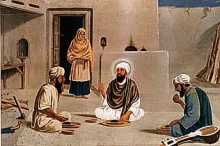Template:AOW35: Difference between revisions
Hari singh (talk | contribs) No edit summary |
Hari singh (talk | contribs) No edit summary |
||
| (9 intermediate revisions by 2 users not shown) | |||
| Line 1: | Line 1: | ||
[[Image: | {{aowh|[[Bhai Lalo's honesty]]}} | ||
[[Image:Lalo5.jpg|thumb|220px|left|<small>[[Guru Nanak]] and [[Mardana]] enjoying the [[Langar|food]] at the humble house of [[Bhai Lalo]]</small>]] | |||
After teaching people in [[Lahore]] to live honestly [[Guru Nanak]] ji returned to [[Talwandi]] to see his parents. | |||
Then after a short stay, he proceeded with [[Mardana]], his long time companion on a extensive journey to visit the sacred places of pilgrimage of the [[Hindu]]s. On the way they reached '''[[Bhai Lalo|Bhai Lalo’s]]''' workshop at [[Eminabad|Saidpur]], presently known as [[Eminabad]] in [[Pakistan]]. | |||
[[Bhai Lalo]] earned his living by '''[[Kirat Karni|honest work]] or [[Kirat Karni]].''' He was nearly seventeen years older than [[Guru Nanak]]. When Lalo saw two holy men coming towards him, he put aside his work and spread a bed for them and went to get some [[langar|food (or langar)]] for them. | |||
As the kitchen was supposed to be the most pure and clean place in a house, [[Bhai Lalo]] asked [[Guru Nanak]] to come there and have his meal. Guru ji said ''“Bhai Lalo, every place is clean and pure for us. Please bring the meal here.”'' So the meal was brought out and [[Mardana]] then divided it into three parts and they all ate it together. | |||
''“This meal tastes like nectar. What has been put in it?”'' asked [[Bhai Mardana]]. [[Guru Nanak]] replied ''“That was the taste of truthfulness and honesty that you tasted. This taste is above the taste of worldly delicacies.”'' {{aowf|Bhai Lalo's honesty}} | |||
Latest revision as of 18:47, 21 January 2012
After teaching people in Lahore to live honestly Guru Nanak ji returned to Talwandi to see his parents.
Then after a short stay, he proceeded with Mardana, his long time companion on a extensive journey to visit the sacred places of pilgrimage of the Hindus. On the way they reached Bhai Lalo’s workshop at Saidpur, presently known as Eminabad in Pakistan.
Bhai Lalo earned his living by honest work or Kirat Karni. He was nearly seventeen years older than Guru Nanak. When Lalo saw two holy men coming towards him, he put aside his work and spread a bed for them and went to get some food (or langar) for them.
As the kitchen was supposed to be the most pure and clean place in a house, Bhai Lalo asked Guru Nanak to come there and have his meal. Guru ji said “Bhai Lalo, every place is clean and pure for us. Please bring the meal here.” So the meal was brought out and Mardana then divided it into three parts and they all ate it together.
“This meal tastes like nectar. What has been put in it?” asked Bhai Mardana. Guru Nanak replied “That was the taste of truthfulness and honesty that you tasted. This taste is above the taste of worldly delicacies.” .....More

